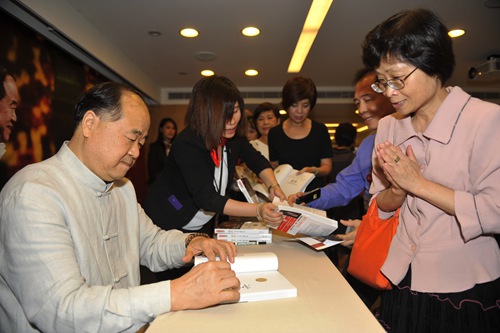|
 |
|
AUTHOR IN TAIPEI: Writer Mo Yan signing autographs to promote his new work, Grand Ceremony, in Taipei on September 21. The book documents Mo's trip to Sweden to receive the Nobel Prize in Literature last December and includes his speeches, interviews and diary entries from the time (LU PENG) |
Eco-friendly Growth
An annual report measuring green development in 30 regions and 100 cities on the Chinese mainland was released on September 22.
The top 10 provincial-level regions in green development announced were Beijing, Fujian, Hainan, Inner Mongolia, Jiangsu, Qinghai, Shaanxi, Shanghai, Tianjin and Zhejiang.
Seventeen provinces were below the national average. Green development in eastern provinces was better overall than that of central and western provinces.
The green development index used in the report consists of three parts—the degree of green economic growth, the potential of natural resources and the environment, and support of government policies.
Drop in Donations
About 81.7 billion yuan ($13.35 billion) in donations from domestic and overseas sources was made to China in 2012, down 3.31 percent year on year, according to the China Charity and Donation Information Center (CCDIC).
This marked the second consecutive year there h
Drop in Donations
About 81.7 billion yuan ($13.35 billion) in donations from domestic and overseas sources was made to China in 2012, down 3.31 percent year on year, according to the China Charity and Donation Information Center (CCDIC).
This marked the second consecutive year there had been a drop in donations, said the CCDIC in a charity report released on September 21.
Xu Jianzhong, an official with the Ministry of Civil Affairs, attributed the decline to the floundering global economy, less serious natural disasters and the lingering "public trust crisis" plaguing the country's charity sector.
The report, however, showed a number of charity organizations remained the primary force in raising donations despite a drop in the value of donations raised.
The CCDIC also reported a surge in online donations. It said that the Internet has become an increasingly popular way of making contributions.
The CCDIC is an organization sponsored by the Ministry of Civil Affairs and has researched charity donations, issuing annual reports since 2008.
ad been a drop in donations, said the CCDIC in a charity report released on September 21.
Xu Jianzhong, an official with the Ministry of Civil Affairs, attributed the decline to the floundering global economy, less serious natural disasters and the lingering "public trust crisis" plaguing the country's charity sector.
The report, however, showed a number of charity organizations remained the primary force in raising donations despite a drop in the value of donations raised.
The CCDIC also reported a surge in online donations. It said that the Internet has become an increasingly popular way of making contributions.
The CCDIC is an organization sponsored by the Ministry of Civil Affairs and has researched charity donations, issuing annual reports since 2008.
Carrier Tests
China's first aircraft carrier, the Liaoning, returned to its homeport on September 21 after a three-month voyage, during which a number of crucial tests on it were completed.
During the voyage, which started on June 11, the carrier witnessed more than 100 landings and takeoffs by various aircraft, including the J-15 carrier-borne fighter, according to an article printed in the Shanghai-based Jiefang Daily on September 22.
J-15 fighters took off and landed on the carrier with their maximum load and various weapons, the report said. Some observers had previously questioned whether the J-15 could take off and land on the carrier with a full load.
The tests have resulted in further improvements of the carrier's flight control processes, according to the Jiefang Daily.
The Liaoning is China's only aircraft carrier in operation, and it was delivered to the Chinese navy on September 25, 2012.
School Inspectors
China is to install independent inspectors in all 300,000 primary and middle schools across the country by the end of this year to improve educational quality and fairness.
The inspectors will be directly managed by education supervision departments of local governments and will be independent from local educational authorities, according to a circular issued by the State Council, China's cabinet.
The move is designed to establish a mechanism for supervision in order to combat what is perceived by some as an "unhealthy" Chinese basic education system, said He Xiuchao, Director of the Ministry of Education's Education Supervision Department, on September 23.
He said that inspectors will deal with complaints from parents and students in addition to supervising schools' enrollment procedures, management, educational methods, curriculum, food safety and sanitation.
The independent inspectors program was first introduced in August 2012 by the State Council.
Pilot schools for the project in Chongqing and Hunan and Shandong provinces were involved even earlier and the results were proven to be effective, He said.
| 